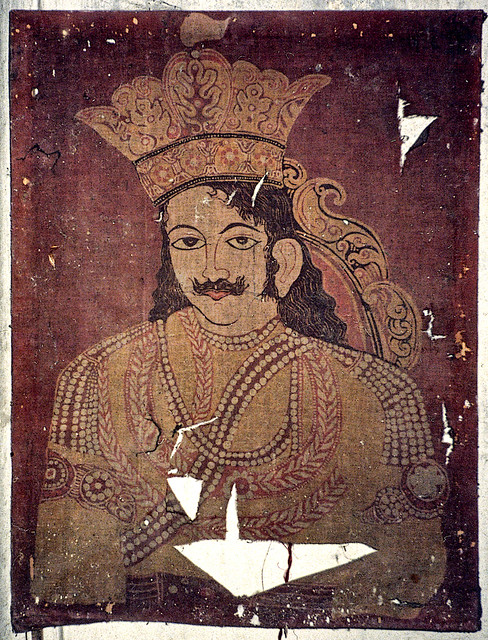
Nawab Wajid Ali Shah in a rare painting
Dr.Mazhar Naqvi
His
“temper is capricious and fickle, his days and nights are passed in the female
apartments and he appears to have resigned himself to debauchery, dissipation
and low pursuits”. This is how the British have portrayed Nawab Wajid Ali Shah-the
last ruler of Awadh kingdom. What the British did to assassinate character of
Wajid Ali to annex his kingdom, Independent India too has been following the
suit. A Delhi based company has named an aphrodisiac after him and successfully
selling it for over three decades. The wrong done to Nawab Wajid Ali needs to
be corrected, for he was a great worshipper and azadar who always strived to live
in accordance with code of conduct prescribed by Islam. Shah was a creative, difficult
and interesting person. He started taking keen interested in poetry and other
forms of art after the British did not allow him to run his kingdom firmly and
finally dethroned him in 1856 on the charge of ill-governance. He spent his
last days in Calcutta(now Kolkata) with sheer number of followers cramped into
his premises, however, gave some impression of pomp—the grounds hosted over
7,000 people, household guards, and dozens of disgruntled begums, not to speak
of a menagerie of monkeys, bears, and 18,000 pigeons.
In his
small state in Matiyaburj locality, Shah built an imposing Imambara and mosque where
he offered his prayers regularly. He used to compose elegiac poetry while
covering the distance between his palace and mosque or Imambara. While there is
no dearth of material portraying Shah as a womanizer and man of low character,
little effort has been made to his contribution to elegiac poetry and emergence
of composite culture in his kingdom. The book published by National Council for Promotion of Urdu
Language, New Delhi on literary contribution of Shah has spared only three out
of almost 700 pages to his marsiya and Nauha writing. This has been done
despite admission of the fact that Shah was a poet of caliber and his elegiac
poetry was comparable to great poets of his era.
For example,
see Kalam of Shah on Janab-e-Sakina, the little daughter of Imam Hussain :
“Bano ne Kaha Main Tere Qurban Sakina
Khol Ankhon ko Aur Baap ko Pahchan Sakina
Do bunde jo the Kano Mein Hilte the Tab
Takti thi har ek chehre ko anjan Sakina
Baiyat ka bahan tha faqat qatl tha manzur
Shabbir pe para bahistaan hai Sakina “
Similarly
Shah remembers the plight of survivors after the martyrdom of Imam Hussain :
“Karbala mein jab ghari Shaam e Ghareeban ho
chuki
Aur sahar manind zulf shab e pareshan ho chuki
Kokab e Zahra pe jab abre shahadat cha gaya
Chandni maili hui aur dhoop uryan ho chuki
Aftab e deen gahan mein aa gaya hai hai
Roshni teri bas ab mahe taban ho chuki
Ansuon ko silsila baqi rahe aie doston
Binte Zahra Shaam mein Majuse Zindan ho
chuki”
Shah’s
marsiya writing has been criticized on two counts. He wrote marsiyas in hurry
and as a result compromised with quality on certain occasions. Secondly, he did
not pay much attention on the opening of his marsiya known as chehra(face).So
his marsiyas fail to catch attention the way writing of other eminent poets does.
However, such shortcomings don’t belittle Shah as marsiya writer in the
backdrop of what he suffered in his life and adversely affected his writing.
Shah
was a generous man. He not only wrote elegiac poetry but also patronized poets
and artists. He held in high esteem Marsiyanigars, Sozkhwans, Nauhakhwans and Azadar-e-Imam.
He offered rewards to them and praised marsiya writers and reciters in these
words :
“Kya kahne
jo marsiya kahe hain
Jo marsiyakhwan
hai parh rahe hain
Mazmoon
bhi bandish bhi maqool
Beshubah
ye marsiya hai maqbool
Dee haq
ne ye tabanhfaiz buniyad
Shagird
jo ho wahi hai ustad
Alam mein
jo ye Sukhan na hota
Mumtaz kabhi
ye fan na hota “ ,
Born in 1822, he wore his hair in ringlets and
dressed in robes. He succeeded to the throne of Awadh in 1847, a state carved
out of the crumbling Mughal empire, Less than a decade after he was told in
1856 that his kingdom would be absorbed into British territory, the Shah cried,
“Why have I deserved this? What (crime) have I committed?” There was no clear
answer, but one hint lies in the fact that the East India Company owed him
large amounts in debt. Why bother repaying a loan when liquidating your
moneylender was a more comfortable option? This is how he had to leave Lucknow
and settle at Calcutta, leaving him a depressed and isolated man. But he did
not forget martyrs of Karbala in the most trying circumstances and did much to
promotion of Azadari in his new abode. A leading Zakir-e-Ahlebait recently
dubbed all the rulers of Awadh as womanizers. He should have not done so, for
his own forefathers had enjoyed patronage of Nawabs when they embarked upon the
mission to turn Azadari in mass revolution in Awadh. As a scholar of international
repute, he should see the passion of Nawabs for Azadari and not their private
lives that have been portrayed with lies by the British authors. More so,no disrespect should be shown to someone who died in 1887 and Islam is avedrse to such utterance.(References available
on request. Photo courtesy Google Images)
No comments:
Post a Comment